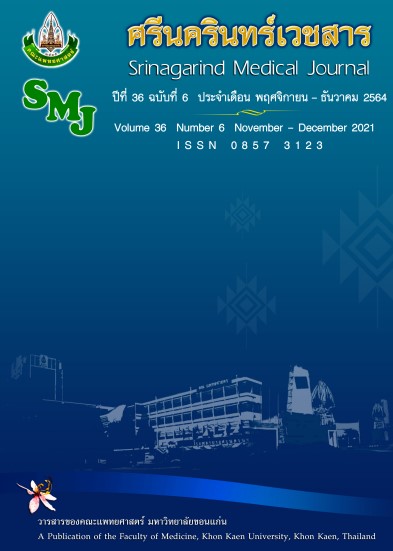Patients’Attitudes towards Experiences and Management of Adverse Drug Reactions
Keywords:
Keyword: Patients' attitudes; Adverse drug reactions; Severity; Experience; Management of ADRsAbstract
บทคัดย่อ
หลักการและวัตถุประสงค์: อาการไม่พึงประสงค์จากยา (Adverse drug reactions; ADRs) เป็นปัญหาจากการใช้ยาที่พบได้บ่อย ผู้ป่วยสามารถเพิ่มอัตราการรายงาน ADRs และเพิ่มการเฝ้าระวังความปลอดภัยในการใช้ยาได้ อย่างไรก็ตามทัศนคติของผู้ป่วยต่อการเกิด ADRs และการจัดการด้วยตนเองยังมีการศึกษาที่จำกัด ดังนั้นการศึกษานี้จึงมีวัตถุประสงค์เพื่อสำรวจทัศนคติต่อประสบการณ์การเกิด ADRs และการจัดการด้วยตนเองของผู้ป่วย รวมถึงปัจจัยที่เกี่ยวข้อง
วิธีการศึกษา: การศึกษาแบบตัดขวาง เก็บข้อมูลที่โรงพยาบาลชุมชนแห่งหนึ่ง ในจังหวัดนครราชสีมา คัดเลือกผู้เข้าร่วมการศึกษาจำนวน 744 คน อายุตั้งแต่ 18 ปีขึ้นไป เคยเกิด ADRs และมีการบันทึกลงในเวชระเบียนของโรงพยาบาล ผู้ป่วยได้รับแบบสอบถามประเภทตอบด้วยตนเองทางไปรษณีย์เพื่อตอบทัศนคติต่อการเกิด ADRs และการจัดการด้วยตนเองของผู้ป่วย แบ่งเป็น 5 ระดับ โดยใช้ 5-points Likert Scale และนำมาแปลเป็นทัศนคติ 3 ระดับ คือ ระดับดี ปานกลาง และไม่ดี
ผลการศึกษา: ผู้ป่วยตอบกลับแบบสอบถามที่สมบูรณ์ จำนวน 340 ราย (ร้อยละ 45.7) พบว่า ส่วนใหญ่เป็นเพศหญิง (ร้อยละ 67.6) อายุเฉลี่ย 58.0 ± 15.24 ปี ทัศนคติต่อการเกิด ADRs และการจัดการด้วยตนเองของผู้ป่วย พบว่าร้อยละ 38.8 เห็นด้วยอย่างยิ่งกับคำถามเชิงบวก “หากเกิดอาการแพ้ยา/อาการข้างเคียงจากยาระดับรุนแรงมาก ท่านจะหยุดยานั้นทันที” ในขณะที่ผู้ป่วย ร้อยละ 15.0 ไม่เห็นด้วยอย่างยิ่งกับคำถามเชิงลบ “ท่านรู้สึกไม่มั่นใจในการรักษาของแพทย์ที่เคยสั่งยาที่ทำให้เกิดอาการแพ้ยา/อาการข้างเคียงจากยา” โดยผู้ป่วยมีทัศนคติต่อการเกิด ADRs และการจัดการด้วยตนเองระดับดี ร้อยละ 21.8 (mean ± SD = 39.08 ± 1.856), ระดับปานกลาง ร้อยละ 77.3 (mean ± SD = 31.64 ± 2.995), และระดับไม่ดี ร้อยละ 0.9 (mean ± SD; 22.3 ± 0.577) เมื่อวิเคราะห์ปัจจัยหลายตัวแปร พบว่า ระดับความกังวลของผู้ป่วยต่อ ADRs ที่ระดับสูงขึ้นจะส่งผลต่อทัศนคติของผู้ป่วยต่อการเกิด ประสบการณ์การเกิดและการจัดการ ADRs ด้วยตนเองที่ต่ำลงอย่างมีนัยสำคัญทางสถิติ (ความกังวลระดับปานกลาง OR = 0.462 และความความกังวลระดับมาก OR = 0.414)
สรุป: ผู้ป่วยส่วนใหญ่มีทัศนคติต่อการเกิด ADRs และการจัดการด้วยตนเองระดับปานกลางถึงดี ดังนั้น การส่งเสริมให้ผู้ป่วยเข้าใจเกี่ยวกับ ADRs และสามารถจัดการกับ ADRs ด้วยตนเอง ควรได้รับการสนับสนุนจากบุคลากรทางการแพทย์เพื่อช่วยเพิ่มการเฝ้าระวังความปลอดภัยในการใช้ยาของผู้ป่วย
คำสำคัญ: ทัศนคติของผู้ป่วย; อาการไม่พึงประสงค์จากยา; ระดับความรุนแรง; ประสบการณ์; การจัดการ ADRs
Background and Objective: Adverse drug reactions (ADRs) are common drug-related problems. Patients’ involvement can increase ADR reporting rate and awareness of drug safety. However, there are few studies of patients’ attitudes towards experiences and management of ADRs Therefore, this study was designed to explore patients' attitudes towards experiences and management of ADRs as well as their associated factors.
Method: This study was a cross-sectional survey study at a community hospital in Nakhon Ratchasima Province. The study enrolled 744 patients aged 18 and over who had experienced ADRs in the previous year and data was collected from their medical records and hospital database system. Patients received self-administered questionnaires by post to rate their attitudes on a 5-point Likert scale. Subsequently, the patients’ attitudes towards their experiences and management of their ADRs were classified at three levels; as, good, moderate, or poor.
Results: There were 340 valid questionnaires returned, giving a response rate of 45.7%. Most respondents were female (67.6%) with an average age of 58.0 ± 15.24 years. Most patients strongly agreed (38.4%) that they should immediately stop medication when they experienced severe drug allergy/side effects. Most patients strongly disagreed (15.0%) that they were not confident in the physicians who prescribed medicines causing drug allergy/side effects. Overall patients’ attitudinal scores towards experiences and management of ADRs were; good level (21.8%, mean ± SD = 39.1 ± 1.86), moderate level 77.3% (mean ± SD = 31.6 ± 2.99), and poor level 0.9% (mean ± SD = 22.3 ± 0.58, respectively. Multivariate analysis showed that higher levels of patient anxiety about ADR experiences (moderate OR = 0.462, severe OR = 0.414) were significantly associated with poorer patient attitudes towards experiences and management of ADRs.
Conclusions: Patients mostly had moderate to good attitude levels towards experiences and management of their ADRs. Therefore, patients' knowledge and management of ADRs should be supported by healthcare professionals to increase safety awareness of their medication use.
Keyword: Patients' attitudes; Adverse drug reactions; Severity; Experience; Management of ADRs




